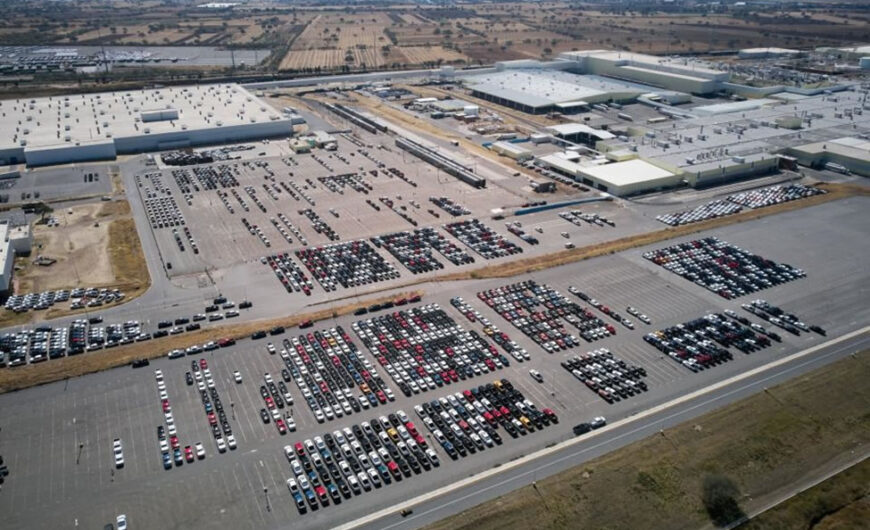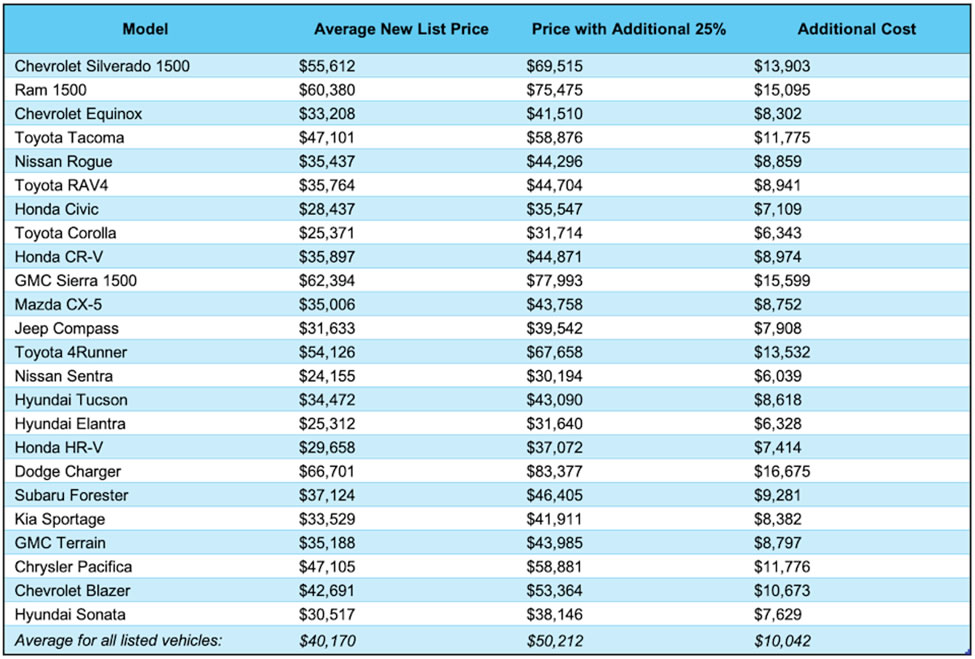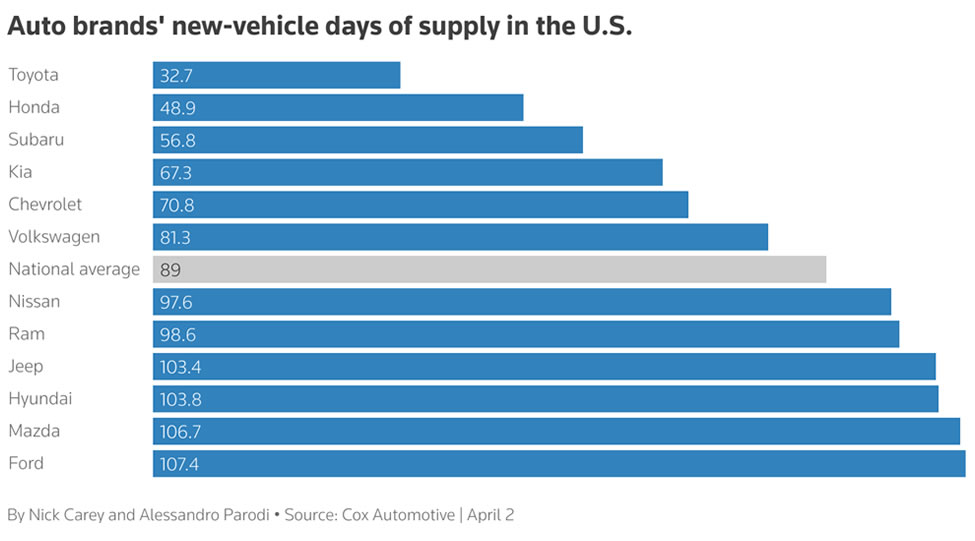
Tariffs implemented by the President Trump early this year have started to affect vehicle prices. Recent data published by Reuters show that the average price of a new car rose 2.5% within the month of April. If you are looking forward to buying a new car, you must be wondering whether the prices would go down anytime soon, or you should buy a one now. Read on and we will help you make the right decision to save money.
Everything You Need to Know about the Recent Tariffs
As of May 13, 2025, the United States is imposing a 25% tariff on all passenger vehicles imported into the country. This is applicable for light trucks as well. Before the Trump administration, this tariff was at just 2.5% level. It was not removed, and the importers now have to pay 27.5% of total tariff for passenger cars imported from other countries.
Car manufacturers and dealerships are not ready to absorb this new tariff. Instead, they will pass it directly to the consumers. As a result, prices of new cars can increase. On average, you can expect the average cost of a car to increase from 10% to 15%. However, we are still too early to predict the final cost increase to the car buyers.
Will the Cost of All Car Brands Rise?

Tariffs are applicable only to cars imported into the United States. However, there are many brands that manufacture vehicles within the country. GM, Ford, and Cadillac are to name a few.
However, not all these US-based car brands manufacture all their vehicles in the US plants. For example, GM is importing their Silverado truck from Mexico. Even if the assembly lines are in the United States, many brands import parts and materials from other countries. As a result, you can expect the prices of American car brands to increase as well.
How Much Will New Tariffs Raise Car Prices?

According to Kiplinger, the average price of a new car will increase by around $5,000 to $10,000. However, brands that assemble cars within the United States will increase their car prices around $3,000 with new tariffs. The exact figures would vary depending on the make and model of the vehicle that you plan to buy.
Car prices increased significantly after the COVID-19 pandemic. As of now, it is quite challenging for an average American to afford a new car. These new tariffs will make car affordability even more challenging for the Americans.
How Do New Tariffs Impact Different Car Brands?
Car prices increased significantly after the COVID-19 pandemic. As of now, it is quite challenging for an average American to afford a new car. These new tariffs will make car affordability even more challenging for the Americans.
| Brand | Response from the Brand | Impact on Pricing | Impact on Production |
|---|---|---|---|
| Toyota | Covering tariff costs for major parts suppliers | No official pricing changes announced | Investing $88M in West Virginia plant to increase hybrid production |
| Ford | Launched "From America, For America" campaign with employee pricing for all customers | Employee pricing until July 4; price increases of up to $2,000 on select models starting May 2 | No changes announced |
| Honda | Adjusting future production plans | No pricing changes announced | Moving Civic Hybrid production from Japan to Indiana this summer |
| Chevrolet | No official statement beyond supporting increased US production | No pricing changes announced | Ramping up Silverado production at Indiana factory |
| BMW | Absorbing tariff costs through April | 4% increase on 2 Series Coupe and M2 Models; other models stable through May | No changes announced |
| Mercedes-Benz | Planning to absorb tariff costs short-term | MSRPs and incentives guaranteed unchanged for April | No changes announced |
| Volkswagen | Paused some US shipments | Pricing guaranteed stable through May | Paused rail shipments of Mexican-built cars; water shipments continuing |
| Hyundai | Customer Assurance" program | No price increases until June 2; ending complimentary maintenance program | Relocated some Tucson production from Mexico to US |
| Nissan | Cutting prices to offset tariffs | Price reductions of $640-$1,930 on Rogue and $670-$1,170 on Pathfinder; no price increases until June 2 | Boosting Rogue production by 50% in Tennessee |
| Jeep | Employee pricing for all customers | Employee pricing available through June 2 | Halting production of Compass and Wagoneer S; next-gen Compass development on hold |
| Audi | Halted all US imports | No impact for vehicles already in US; likely higher fees for future imports | All imports on hold until further notice |
| Subaru | No official response | Current US inventory prices stable; special orders to see increases | Indiana facility to begin assembling Forester this year |
| Tesla | Expressed concerns about increased production costs | No immediate price changes announced | No specific changes announced |
| Mazda | Planning to absorb $100M in tariff costs | Prices guaranteed for vehicles already in US and imports until May 1 | No changes announced |
| Mitsubishi | Suspended all vehicle imports | Stable prices for pre-tariff imported vehicles | Halted all US vehicle imports as of April 14 |
The Impact of Tariffs on the Used Car Market
The tariffs are only applicable for new imports, so it shouldn’t technically impact the used car market in the United States. However, statistics show that the new tariffs are impacting used car market significantly as well.
According to data published online, auto dealers had to spend 3.3% extra to purchase used vehicles in April when compared to the previous month. According to Jeremy Rob, a Senior Director at Cox Automotive, the average cost of a 3-year old vehicle increased by 2.6% within the month of April. Moreover, he also emphasized how customers were rushing to buy more cars, assuming the impact that tariffs would have on the used car market.
How Would the Future Look Like?
It would take years for them to build factories in the US soil and re-route supply chains. Moreover, it is challenging to develop workforces overnight as well. But still, United States is the largest consumer, which gives car brands a reason to think twice. We are yet too early to predict how the future would look like.
The goal of Trump Administration is to bring back manufacturing jobs into the United States. However, the overall auto manufacturing industry is a complex, high-cost business model. Hence, we won’t be able to see all car brands moving their assembly lines into the United States.
Should You Buy a New Car Now?
As you can see, car prices will obviously rise with these new tariffs. If you are in the market looking to buy a car, it would be a good idea to wait. Some people panic buy, but it won’t offer any significant benefits to you.
If the wheels of the car that you drive are falling off, and if you really need to buy a new car, you can go for a one. But if not, it is better to wait for few more months and see. That’s mainly because the President Trump is negotiating with other countries for trade agreements. For example, the President agreed to drop tariffs implemented on imports from China on 12th May.
We never know what other agreements will be signed in the future. However, the prices of new cars are less likely to rise from what you can see as of now. If you need more insights on this issue or if you are confused whether to buy a car now or not, feel free to get in touch with us at Auto Advisors Hub today. We will go through your unique situation and guide you to make the right decision.
We never know what other agreements will be signed in the future. However, the prices of new cars are less likely to rise from what you can see as of now. If you need more insights on this issue or if you are confused whether to buy a car now or not, feel free to get in touch with us at Auto Advisors Hub today. We will go through your unique situation and guide you to make the right decision.
References:
- https://www.truecar.com/auto-tariffs-explained/
- https://www.bbc.co.uk/news/articles/cn93e12rypgo
- https://www.theguardian.com/us-news/2025/mar/26/trump-new-car-tariffs
- https://www.reuters.com/business/autos-transportation/us-car-prices-higher-april-after-tariffs-hit-2025-05-12/
- https://www.brookings.edu/articles/the-impact-of-us-tariffs-on-north-american-auto-manufacturing-and-implications-for-usmca/
